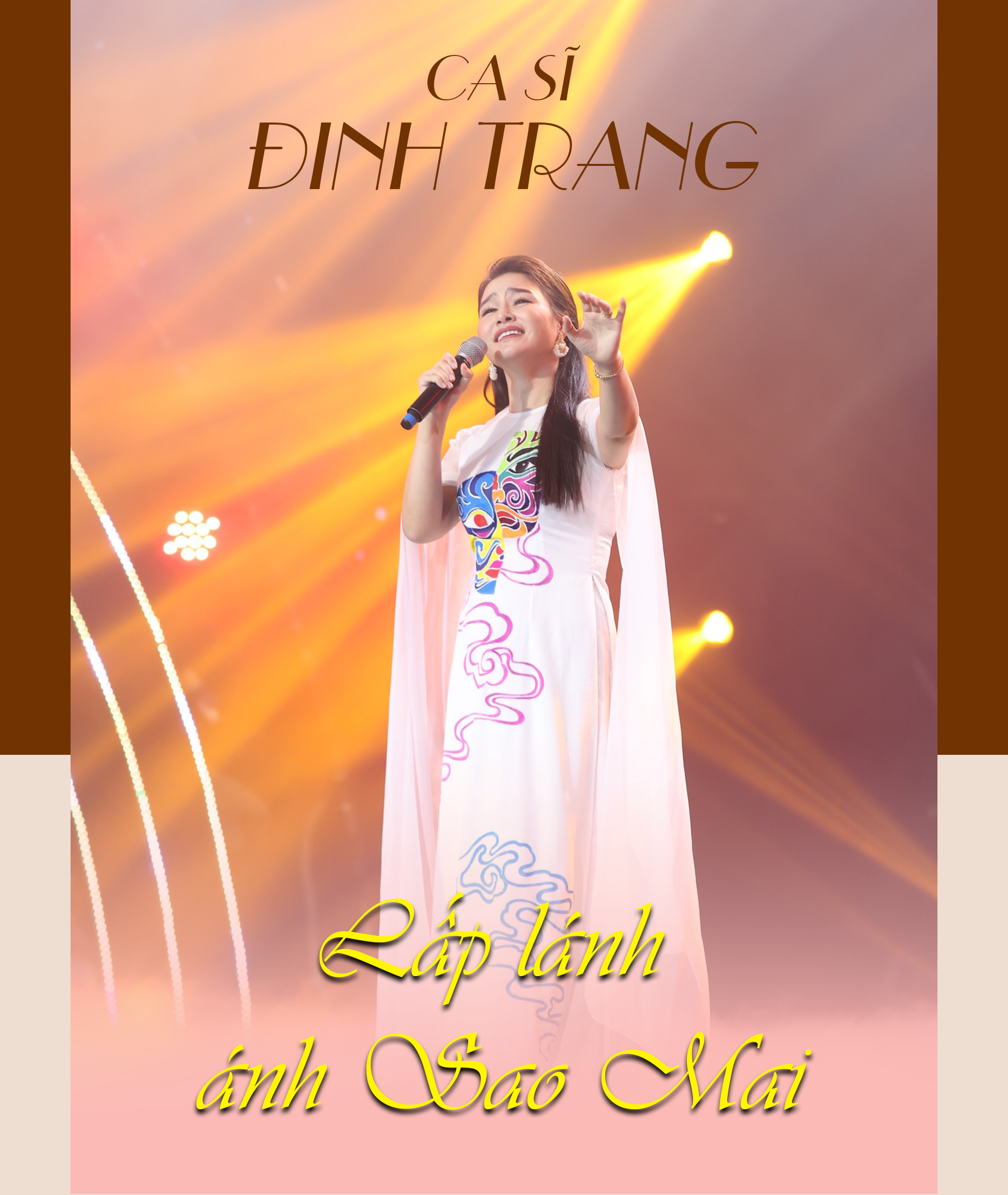

Dinh Trang was born and raised in an ordinary family in the coastal town of Cua Lo, with no artistic tradition. Therefore, the girl with a good singing voice did not dare to dream big since she was young, although she had a vague thought of wanting to go to music school. However, from a young age, Trang was encouraged and supported by her family, especially her mother. Whenever there was a big or small competition, she was "escorted" by her mother. Her mother always believed that she was someone who could make a name for herself in the singing career. And that companionship, in addition to love, was also faith in her little daughter. "And my mother was also the first audience to enjoy my songs, and the last person to applaud me on every big or small stage," Trang shared.
Then, with the encouragement of her mother and family, Trang applied for the vocal class at the College of Culture and Arts and was accepted. However, the dream of swimming in the vast ocean of art always urged Trang to find a bigger musical environment.

Dinh Trang said: “In 2005, poet Pham Tien Duat took me to meet Ms. Thu Lan - former Head of the Vocal Department, Vietnam National Academy of Music. At that time, I was only in 11th grade, had a shy and timid personality, and had a small voice. Ms. Thu Lan refused to teach me and "chased" me home because she saw that I had not graduated from high school. At that time, I thought that my ability could only be to be a music teacher, the dream of becoming a singer was probably too far away.” Yet 3 years later, Trang went to Ms. Thu Lan again with the determination to find the key to conveying her weak voice. “She accepted me not only because of my maturity in singing but also because of my determination to pursue my dream,” Trang recalled.
Passing the university entrance exam of the National Academy of Music, Trang embarked on the path to conquering her dream. She always thought that she had a low starting point, did not have natural talent like some of her friends, so she had to study hard and study really well, study with the energy of a child born and raised in a land of sun, wind and salty sea, study with the promise to herself and her family to become a famous singer. So, that year, the student persevered with rigorous physical exercises to have abundant abdominal breathing energy, a strong breath column, a bright sound and the standard opera vibrato. Heaven does not disappoint those who try, after months of hard training, Trang received compliments from Ms. Thu Lan, and great expectations from her teacher, People's Artist Trung Kien, who taught her for all 4 years of university and 2 years of graduate school. And after days of eating, sleeping, playing... and singing, the small girl weighing only 40 kg, with a thin breath and small voice, has transformed into someone with an extremely thick, resonant opera voice with a vibrato that few can match.

Also from the encouragement and motivation of teachers, in my third year at the National Academy of Music, I boldly tried my hand at a big stage, a music playground that any vocal student would want to reach. That is the Sao Mai contest, a music talent contest organized by Vietnam Television.
Going to the competition, her heart was filled with a hundred worries when her family could not afford to pay for lessons, clothes, and the most necessary expenses for a contestant. However, Dinh Trang still decided to compete to gain valuable experience for her career. Although she entered the competition with the intention of learning, she had a serious attitude and prepared thoroughly and systematically for this competition with carefully selected songs. "Singing while waiting for you to come back" by musician Xuan Thuy, "Thank you, Mom" by musician Duc Trinh, she took care of both vocal technique and the singer's emotions.
Before the competition night, the girl had lost sleep because of worry and nervousness, but somehow when standing on stage, energy suddenly came flooding back, the lyrics and melodies just poured out with emotion and love. And Sao Mai that year had a more dignified and confident Dinh Trang with a beautiful, rich voice, an impressive range of sounds, conquering the hearts of many listeners.


Trang said that she still remembers the night of the ranking competition, many audiences cried when she sang "Thank you, Mom" by musician Duc Trinh, cried because they resonated with the emotions she brought to the audience, because of the delicate and touching handling of the lyrics and each note of the song. Trang said that she chose "Thank you, Mom" not only because of the flowing melody of the purest, greatest love in the world, but also because it was her thoughts when thinking about her mother. Singing with her heart, perhaps that's why the song on the Sao Mai stage that year was received with the greatest sympathy by the audience.
In addition to “Thank you, Mom”, “Singing while waiting for you to come back” performed at Sao Mai also helped her gain a large number of fans because of the success in her delivery and the new sounds she brought to life. “Singing while waiting for you to come back” was also the song that brought her to the glory of Sao Mai chamber music that year.

With the Sao Mai Second Prize, Trang said that it was a reward for the 8X coastal girl who knew how to strive to rise up. Because after this prize, Trang became known to the public, was invited to sing many times and she had more income to treat her mother's illness. Equally important, from now on she has a springboard to live with her passion for chamber music, with the attempt to convey opera delicately, luxuriously but still smoothly, passionately, full of lyricism.
Two years after that competition, Trang was again on the podium with the prestigious Opera Award. “Before, all my life I only dreamed of singing with a string orchestra on a big stage, but now I can do it” – Trang confided. She joined the professional Opera when she was pregnant with her first son, but she sang with resonant energy. And Aria in Trang’s opera performance was very successful even without the support of a microphone.

Trang once revealed that it was folk music that helped her nurture her passion for chamber music. Because singing folk music was the way she got closer to her hometown audience, the way she got to stand on many event stages, but chamber music was not like that, it was a music genre with a strong scholarly quality that could only be performed on larger stages, with a more "choosy" audience. If you want to "live" long-term with chamber music, if you want to freely produce albums with a strong chamber music quality, you need to have a solid foundation to "feed" it. And Trang chose folk music to do that.
Trang said that now she can sing the music she loves, conquer difficult techniques and live with a burning passion. “For me, that alone is enough to make a full life.”

